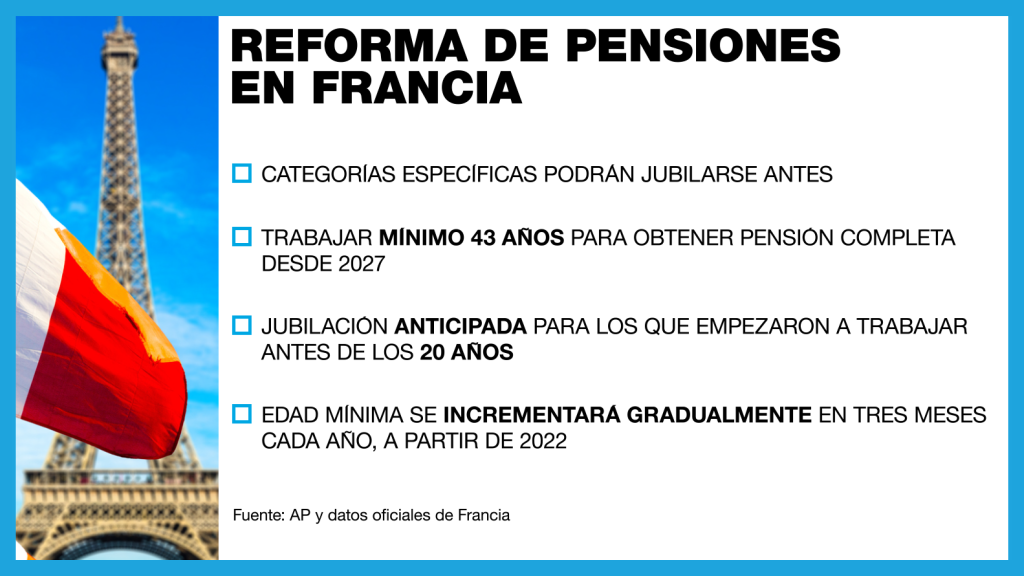First modification:
On the table since before the Covid-19 pandemic, the French president’s pension reform landed to increase the retirement age from 62 to 64 by 2030. The Government affirms that if the reform is not implemented, everything the pension system would be unsustainable. The political opposition, unions and citizens have dismissed the proposal as unfair.
A reform that was rejected by the majority of French from the beginning. When French President Emmanuel Macron made the announcement of the project, strikes broke out in the transport sector and protests lasted for weeks.
The Covid-19 emergency stopped the project, but sooner or later one of the proposals that the president had already planned since the electoral campaign would arrive. On Tuesday, January 10, the reform was revived.
“Working more will allow future retirees to obtain higher pensions,” said Prime Minister Elisabeth Borne the day she revealed the changes to the project, explaining, furthermore, that the minimum retirement age to be entitled to a full pension will be increased gradually, in three months each year, starting this year.
Some jobs will fall into so-called ‘specific categories’, which will allow people to retire earlier, such as firefighters or police officers.
The French will have to work a minimum of 43 years to obtain a full pension from 2027 and those who started working before the age of 20 will be able to obtain early retirement and the minimum retirement age.

Pascal Drouhaud, an analyst of French politics, spoke to France 24 and explained how the pension structure works in France: “Unlike some countries, we don’t have a funded system, it’s a pay-as-you-go system. What does it mean? It means that the assets pay for retirement pensions; it is a system that we have in France since the end of the Second World War”.
The retirement age in France, one of the lowest in Europe
France’s minimum retirement age currently stands at 62 for men and women, the lowest in Europe if Poland and Austria are excluded, where women can retire at 60. Men, on the other hand, need a minimum of 65 years to receive their pension in those two countries, which means, once again, that it is an age above the current age in France.

In Bulgaria, Denmark, Greece, Italy and the Netherlands the minimum retirement age is 67 years if rounded up by additional months.
Germany, Europe’s largest economy, plans to make the pension age 67 by 2031.
A reform with more resistance than approval
As happened two years ago, unions and workers have taken to the streets to reject Macron’s project and even called on the French to come out on January 19 for a large mobilization to veto the measure.
The groups also have the support of the president’s main political detractors, both from the extreme left and the extreme right.
Après avoir été élu grace à la gauche et à la France insoumise, Emmanuel Macron va tenter désormais, avec le soutien de LR, de faire passer la retraite à 64 ans. Les Français peuvent compter sur toute notre détermination pour faire barrage à cette réforme unjuste.
— Marine Le Pen (@MLP_officiel) January 10, 2023
On the other hand, very few have supported the project. 58% of the people surveyed by Elabe assured that the reform is unfair, more than 60% believe that this is not the time to reform pensions when the cost of living is so high and only 18% believe that the measure is appropriate.
The reform of portraits proposed by #ElisabethBorne reprend celle que nous votons au Sénat (64 years, 43 annuités et 67 years pour le taux plein). Comme nous l’avions suede la revalorisations des petites retraites, de celles des mères de famille ont été pris en compte.
— Bruno Retailleau (@BrunoRetailleau) January 10, 2023
The entire pension system cost the government 14% of GDP in 2021, more than most other industrialized nations.
For Pascal Drouhaud, the reaction of the French has a cultural and historical explanation: “We are in a country that is confronted, where there are debates, strikes, demonstrations, because it is considered that acquired rights are no longer forever and that is where the difficulty lies.” because the notion of modernity and social conscience is being mixed with the figures, which say that if the reform is not carried out, the deficit is calculated at 13,000 million euros”.
Emmanuel Macron became the first French president in a generation to lose a majority of the National Assembly in parliamentary elections last year, with this, now the youngest president in French history, he will have to convince some conservative parliamentarians or resort to Article 49.3, the most controversial constitutional tool of the Fifth Republic, which has been used repeatedly during his tenure and which would allow him to circumvent Parliament completely, ignoring the loss of popularity if this is done.
With Reuters and AP













